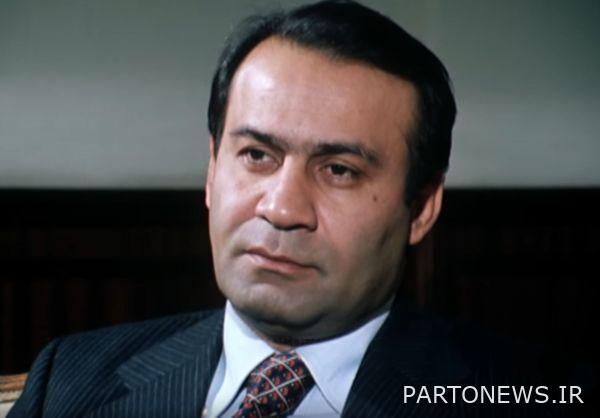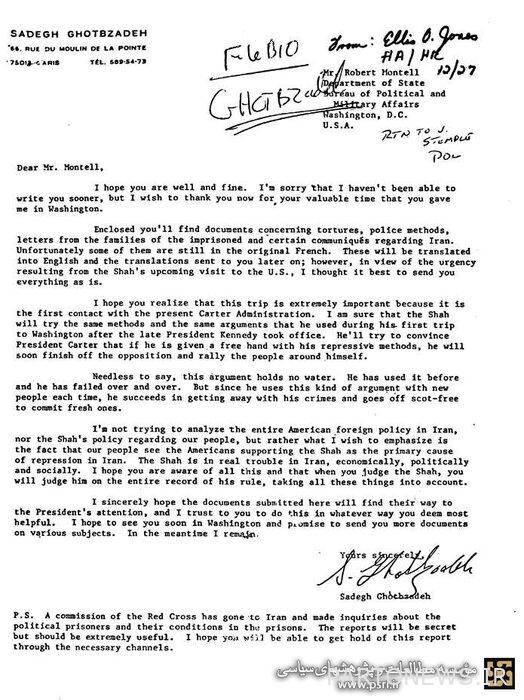Qutbzadeh’s unpublished letter to the US State Department + picture

According to IRNA Political Group, in the fall and winter of 1357, the speed and frequency of events in Iran was high, and Henry Perkat, who had just spent a few months in his new role as the head of the Iran Department in the Middle East Affairs Office of the US Department of State, was going through busy days. In these few months that Imam Khomeini was stationed in France, in addition to the clerics who were with him in Najaf, some other figures were added to his circle. One of the tasks that both the CIA and the US State Department had defined for themselves was identifying the background and personality of these people.
One of them was “Sadegh Qutbzadeh”. Although he was initially among the students living in Paris, in recent years his name was heard more from the circle of Imam Musa Sadr’s circle. Although in recent years, Qutbzadeh was also associated with Beit Imam in Najaf, but because he had found relatively good connections with various European and Arab figures during his many years of campaigning activities, he saw himself as an independent and progressive person and had his own separate actions. The image of “human rights” of the Carter administration was one of the axes that attracted some fighters inside and outside Iran, and they went to interact with American personalities with the dream of slowing down the process of American support for the Shah. Most of them did not want to make it public. During the disclosure of the documents of the American embassy in Tehran, the names of a number of people and groups who had a dialogue with the Americans with such an approach were published. Qutbzadeh was one of these people.
In the documents of the US Embassy in Tehran, there is a document that shows that Qutbzadeh met with George Griffin, the head of the Middle East and South Asia desk of the US Department of State’s Intelligence and Research Office, in December 2015. He introduces himself as “the head of an Iranian resistance movement based in Paris” and “underground and secret contacts with all levels of Iranian society, including the military”, and his purpose of this trip is to contact Americans who are inside or outside the US government with the situation. Iran says they are familiar. At the end of this meeting, Qutbzadeh gives Griffin a letter addressed to “Robert Mantel”.
Qutbzadeh’s choice was apparently accurate. Mentel was in charge of the “Office of Security Assistance”, one of the branches of the “Office of Political-Military Affairs” of the US Department of State. The Office of Political-Military Affairs is actually the liaison between this ministry and the Ministry of Defense, and its task is to provide plans and strategies in the fields of international security, security assistance and military operations. There is no other document on how Mentel reacted to this request and other possible meetings and letters of Qutbzadeh during his trip to America; But the relationship between Qutbzadeh and Griffin continued until the summer of 1357, at least by sending one more letter.
One year after that meeting, in January 1357 and during the days when Qutbzadeh’s name is mentioned as one of Imam Khomeini’s entourage in France, the report of this meeting and the text of his letter were sent to Perket by Mantel and a copy was sent to the American Embassy in Tehran. arrives. The text of this report and letter was published in the leaked documents by the Imam’s followers after the capture of the American embassy. For the first time, the Institute of Political Studies and Research publishes the image of these two documents along with their text.
First document: Griffin’s report of the meeting with Qutbzadeh, a copy of which was sent to Perket by Mantel.
Confidential memo from: Robert Mantel Pm/SSP
Document date: January 17, 1979-27/10/1357
To: Mr. Henry Parkett NNBA/IRN
Subject: contact with Sadegh Qutbzadeh in November 1977
I would like to draw your attention to the summary of the negotiations with Sadegh Qutbzadeh, who, according to recent newspaper reports, is apparently one of the key aides and spokesman of Ayatollah Khomeini. Qutbzadeh approached me one day in November 1977 and asked to have lunch with him and introduced himself as the head of an Iranian resistance movement based in Paris. I asked Charlie Nass, then director of Iranian affairs, if he knew anything about Qutbzadeh. Nas had no information about Qutbzadeh or his organization. I then had lunch with Qutbzadeh. That is, about two or three weeks before the Shah visited America in December 1977. If my memory is not wrong. The points that Qutbzadeh mentioned were as follows: He has come to America to make contact with Americans who, as far as he knows, are familiar with Iran’s affairs, both inside and outside the government. (He was apparently familiar with my report for the US Senate Foreign Relations Committee entitled “US military sales to Iran”).
He and his organization are admirers of America and the ideals that America defends. He was particularly pleased with the Carter administration’s emphasis on human rights and saw an opportunity to influence the Carter administration’s policies. Until the Carter government does not repeat the mistakes of previous governments. These mistakes include equating America’s interests in Iran and the region as if these interests are parallel and subordinate to the ideas, policies, and actually the continuation of the Shah’s rule in Iran.
The Shah is universally hated in Iran, and pressures throughout Iranian society against the Shah and his repressive form of government are about to intensify. Despite SAVAK, he and his organization have underground and secret contacts with all levels of Iranian society, including the military. The calls suggest that the king is becoming increasingly unpopular and that a revolution is brewing. Because the United States believes that its interests require unconditional support for the Shah and his policies, the United States is aligned with the Shah’s repression. Iran and the United States of America have many common interests, but the United States of America will suffer when the revolution ends, unless the Carter administration takes measures to avoid aligning with the regime and suppressing it. As for the military, high-ranking generals and other leaders have all been bought off by the king, but junior and middle-ranking officers are increasingly disgusted by the corruption and repression that goes on around them. When the desired event happens, most of the military will support the people of Iran rather than their corrupt rulers.
In the end, Qutbzadeh emphasized that he sees new hopes in terms of human rights policies in Carter’s government. He expressed his hope that the president’s policy of refraining from arms sales will lead to a more realistic stance towards the Shah’s demands, many of which are simply a waste of Iran’s treasures.
Following the meeting with Qutbzadeh, I discussed the above with Charlie Nass. Later, Qutbzadeh gave me the information that was published by his organization, which was the announcement of August 22, 1978 [مرداد ۱۳۵۷] In the name of Ayatollah Khomeini. I gave all this information to HA/JR, who I understand distributed it to NEA/IRN and IRN/RU and others.
After this lunch and following the personal letter of Qutbzadeh in December 1977, which was reviewed, I did not have any news that he personally sent, and this was a predictable thing.
Qutbzadeh seems like a serious man who spoke in a moderate and wise tone. He hoped that the new government would change the US policy towards Iran and if it happens, he would welcome it. He did not seem ideologically anti-American. I hope that the above steps are interesting for you and may be of use.
George Griffin
The second document: the text of Qutbzadeh’s letter addressed to Mentel, the head of the security assistance office of the Office of Political and Military Affairs of the US Department of State.
Dear Mr. Mantel, I hope you are well. I regret that I could not write to you sooner, but now I want to thank you for the valuable time you gave me in Washington.
Attached are documents related to torture and police methods, letters from imprisoned families, and some announcements about Iran. Unfortunately some of them are still in the original language, French, these will be translated into English and the translations will be sent to you later. Considering the urgency of the King’s arrival with the United States of America, I thought it best to send you everything as it is.
I hope you understand that this journey is extremely important. Because this is the first contact with the current Carter administration. I am sure that Shah will try to repeat the same methods and the same arguments that he used during his first trip to Washington after Kennedy took office as president. He will try to convince President Carter that if he is given the freedom to use repressive methods, he will soon destroy the opposition and bring the people back to him.
Needless to say, this argument is baseless. He has used this argument before and failed each time. But since he uses this type of reasoning with new people every time, he manages to get away with his crimes and commit new crimes without fear of punishment. I am not trying to analyze the entire American foreign policy in Iran or the Shah’s policy towards our own people, but what I want to emphasize is the fact that our people see American support for the Shah as the main cause of repression in Iran. . The Shah in Iran has suffered a real headache, both economically, politically and socially. I hope that you are aware of all these things and that when you judge the Shah, you judge him according to all the records of his reign and Or you will judge by considering all these facts.
I sincerely hope that the documents enclosed with this letter will be forwarded to the attention of the President, and I trust that you will do so in any way you deem expedient. I hope to see you soon in Washington and I promise to send you more documents on various subjects. At the same time, I express my devotion to you.
Signed by Sadegh Qutbzadeh
(Meanwhile)_A commission from the Red Cross has gone to Iran and conducted research on political prisoners and their conditions in prison. The relevant reports will be confidential but should be extremely useful. I hope you get this report through the proper channels.


